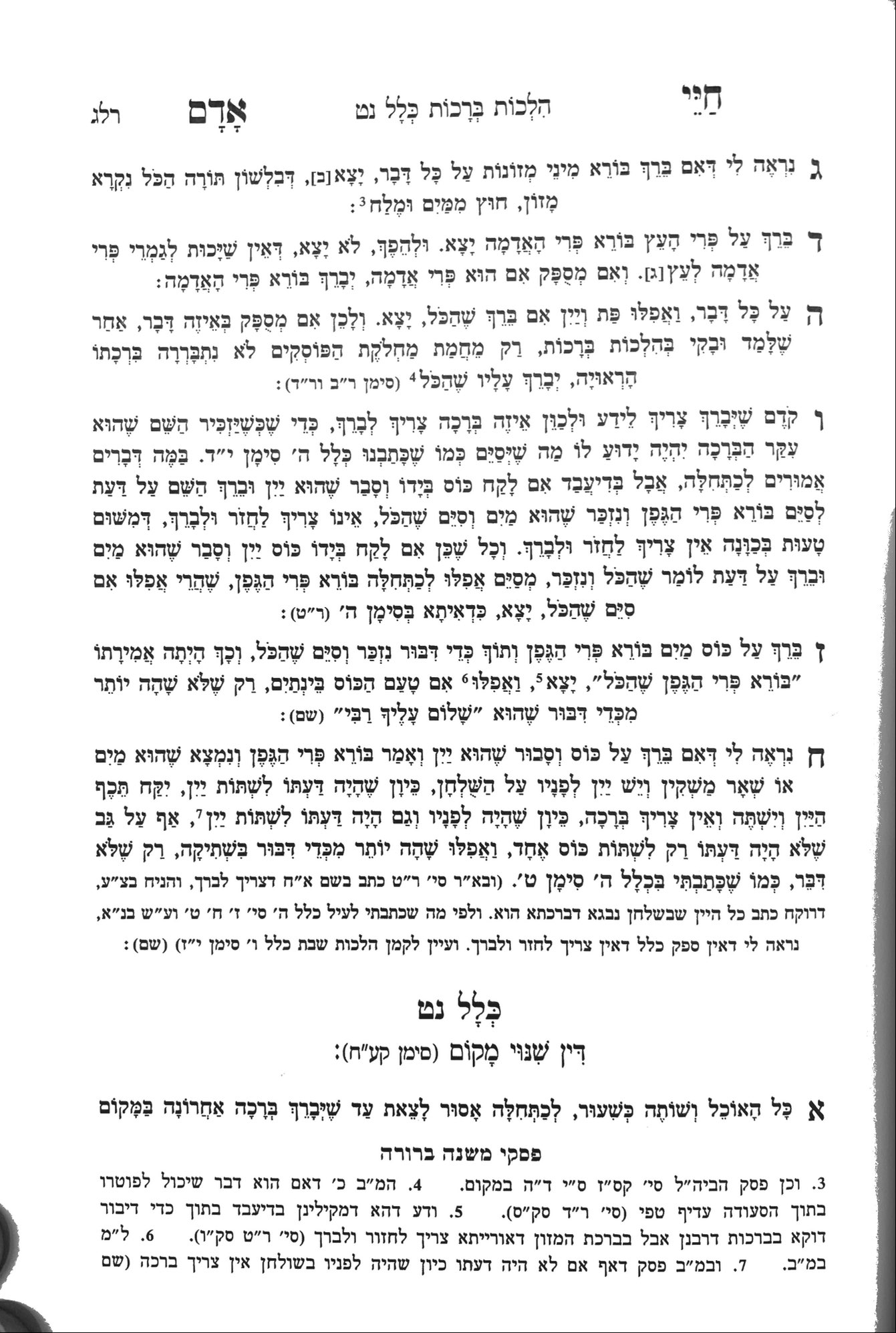We are continuing in siman 7. We left off in the previous shiur discussing one who had intent to recite al hamichya, and only realized they must recite birkas hamazon after saying baruch atah Hashem. We learned that such a case is a safeik, and generally we apply the rule that regarding a bracha derabanan, one does not have to repeat the bracha because of the general rule that safeik brachos le’hakeil. However, the Mishnah Berurah pointed out that we do not apply this rule to a bracha deoraysa. Thus, if one were to say baruch atah Hashem with the intent to recite borei nefashos, and then realized they need to recite birkas hamazon, they would have to repeat the bracha out of safeik.
The question with which we left off regarded al hamichya, due to the machlokes rishonim whether one can fulfil their chiyuv to recite birkas hamazon by reciting al hamichya. This question depends on whether the chiyuv deoraysa to recite birkas hamazon is to recite the three brachos as we have them, or just to mention the ideas espoused within the first three brachos.
If one has to recite the first three brachos as we have them, they would not be yotzei birkas hamazon by reciting al hamichya. Therefore, if they had kavanah when saying baruch atah Hashem for al hamichya, we have a similar safeik to that of borei nefashos. However, if one needs to just mention the ideas of birkas hamazon, they could be yotzei with al hamichya. Therefore, if they had kavanah when saying baruch atah Hashem for al hamichya, they would not repeat the bracha, due to the safeik that they were yotzei.
The Mishnah Berurah does not discuss this case directly. The Chayei Adam discusses it in Nishmas Adam (in Klal 47:1), and concludes that one is not yotzei even bedieved, and must begin birkas hamazon from the beginning. He holds in accordance with the Rishonim who hold that the chiyuv deoraysa of birkas hamazon is to recite the three brachos as we have them, and therefore due to the safeik deoraysa, one must repeat the bracha. However, many achronim, including Rav Akiva Eiger, the Shulchan Aruch Harav and Even Ha’ozer, disagree with the Chayei Adam, and hold that in such a case a person would be yotzei, in accordance with the Rishonim who hold that one needs to just mention the ideas of birkas hamazon.
The Mishnah Berurah (beginning of siman 191) does write that, in his opinion, one does not need to recite all three brachos of birkas hamazon in order to fulfil their chiyuv mideoraysa of benching, but rather just needs to mention the ideas within them. He uses this point to explain the Gemara which states that workers who are working for an employer would only recite one bracha. In this way, they were able to fulfil their chiyuv deoraysa of birkas hamazon with the most minimal cost to their employer’s time.
Although we can learn from here the Mishnah Berurah’s opinion regarding the text necessary for birkas hamazon, we cannot learn from here his opinion regarding the safeik created when one had the wrong intent when they recited the words baruch atah Hashem. However, since that safeik is a safeik miderabanan, we can apply the rule of safeik derabanan lekulah and assume that according to the MIshnah Berurah, as well, one would be yotzei bedieved.
On the other hand, the Elyah Rabba and Bach hold one is not yotzei, even mideoraysa in our case.
Therefore, the Kaf Hachaim (in siman 187) writes that since this question is such a major machlokes, one should wash again, eat a kezayis worth of bread, and recite birkas hamazon with intent to cover both meals. If one is not able to eat again, they should think the text (hirhur) of birkas hamazon in their heart. The ability to think the text is based on the Rambam who holds that if a person is unable to recite a bracha, they can think it in their heart and fulfil a chiyuv in that manner. Although we do not pasken in accordance with the Rambam, we do suggest it in certain scenarios, such as ours, so that the person accomplishes at least something.
Summary
-
Lechatchilla, a person should have kavanah for the bracha they are about to recite before beginning to recite it.
-
Bedieved, regarding a bracha derabanan, if a person had kavanah for a different bracha when they recited Hashem’s name, they are yotzei.
-
Regarding a bracha deoraysa, if a person had kavanah for a bracha derabanan when they recited Hashem’s name, such as borei nefashos when they were meant to recite birkas hamazon, they are not yotzei even bedieved.
-
If one had kavanah for al hamichya when they recited Hashem’s name when they were meant to recite birkas hamazon, it is a machlokes whether one is yotzei. Therefore, one should wash again, eat a kezayis worth of bread, and recite birkas hamazon with intent to cover both meals. If they are unable to wash again, they should think the text of birkas hamazon in their heart.
-



